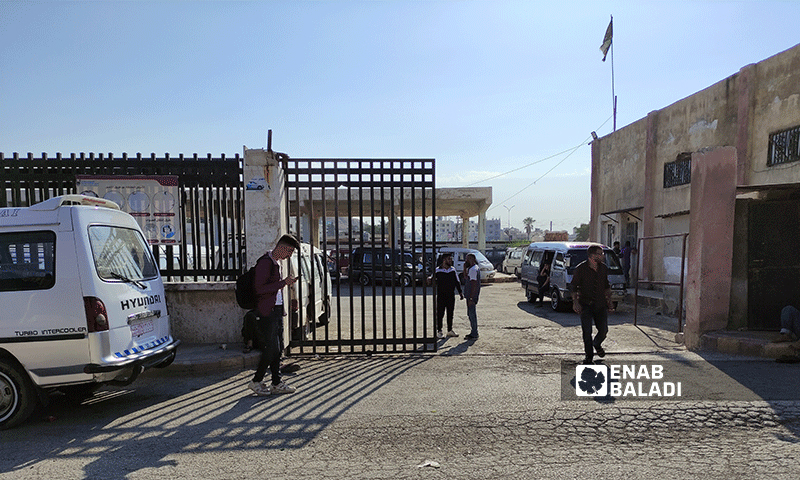Azaz – Walid Othman
Ziad al-Hassan, a student from Idlib city at the Free Aleppo University in Azaz city in northwestern Aleppo, has to make sure to arrive in the bus transfer station many hours before his travel journey from Idlib to Aleppo, as there are no private transport companies nor regulated or fixed schedules for bus journeys between the cities and villages of northwestern Syria.
Al-Hassan told Enab Baladi that the travel journey to his university is taking double its actual time due to the poor infrastructure of roads linking between the region’s cities and villages, amid the absence of rehabilitation projects to road networks in the northwestern region.
The young man added that the region’s poor roads are not the only problem facing students during their regular journeys between Idlib and Aleppo’s northern countryside. He added that dozens of military checkpoints set along the road between Idlib city’s entrance and Azaz’s are hampering traffic movement, particularly that of public transportations.
Al-Hassan recounted to Enab Baladi his suffering as he is forced to show his identity card and reply to the same questions many times at every school day just because the military factions and police services supervising the checkpoints do not have a security checking system that would make things much easier by inspecting personal data of students quickly for only one time and at one checkpoint daily.
Students from Idlib have to take a road journey from Idlib to Sarmada and then to Darat Izza to al-Basoutah village. After that, the journey continues to Afrin and then to the arrival station of Azaz, where the Free Aleppo University is located.
These road trips that sometimes take up to five hours do not include roadside rest-stops but the one in Afrin bus station.
Last May, the Idlib Inland Transportation Company announced a transport line between the cities of Idlib and Azaz with discounted fares for students.
As of the beginning of last June, the average passengers’ fare has become 27 Turkish liras (TL = 3.16 USD), while students’ fare has amounted to 20 TL (2.34 USD).
Poor transportation services
Abdullah Rasheed, a student at Free Aleppo University, told Enab Baladi that transportation, in general, is bad in northwestern Syria, particularly in the summer.
Mini buses operating in the region are not equipped with air conditioning systems or even curtains to reduce the sunlight heat, as military factions ban them for security reasons.
Rasheed added that passengers have to wait a long time at every checkpoint, sometimes for an hour or more, especially at the checkpoint that separates the regions of the Hayat Tahrir al-Sham (HTS) in Idlib from the regions controlled by the Syrian National Army (SNA) in Aleppo countryside.
The transportation problems encountered by university students at the Free Aleppo University are a side of many challenges facing students in their study journey within difficult military and economic circumstances in northwestern Syria.
With the northwestern region being under the control of several military and administrative powers, the roads of the region have become filled with checkpoints belonging to different sides, carrying out separate security check-ups to civilians, including students.
In 2018, the Syrian Salvation Government (SSG), the de facto authority governing Idlib governorate and parts of Aleppo’s western countryside, closed the Free Aleppo University’s faculties and headquarters in al-Dana town in northern Idlib.
This move prompted the Syrian Interim Government (SIG), the de facto authority governing Aleppo countryside and supervising the Free Aleppo University, to move the university’s headquarters from Idlib to Aleppo countryside, which forced many students from Idlib to take a daunting daily journey to Aleppo in pursuit of education.











